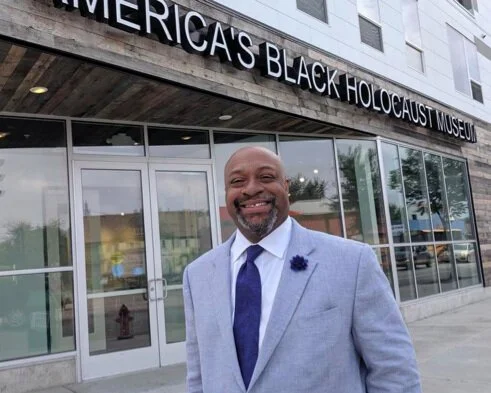Dr. “Bert” Davis • Conversations on race | "What can YOU do?"
Over the past months, we’ve been asking individuals we trust difficult questions about the pandemic and leadership.
But now, another series of questions must be asked: About racism.
Here are some answers from Dr. Robert (Bert) Davis, who leads the America’s Black Holocaust Museum in Milwaukee, which is playing a role in the current discussion of racial justice.
Here are Dr. Davis’ responses:
The death of George Floyd has catapulted issues of day-to-day Jim Crow practices, police violence, race, and ethnic misinterpretations/differences, socio-economic as well as health disparities exacerbated by COVID 19 to the forefront of America’s and the worlds psyche.
I dare to say that we have not seen a confluence of critical issues affecting the entire world most especially the United States ever in our history.
Let’s talk … better yet, please listen.
So much of the civil unrest and protest is due to communities that feel unimportant because no one is listening to them. This is a means to capture the attention of the world.
Ground rules for discussion: As we start to engage one another in dialogue and emotional exchanges we must be considerate of the necessity of these gatherings to be orchestrated in a safe, peaceful, loving, and respectful manner. Our goal is change … positive change.
Diversity, Equity, Accessibility, and Inclusion must be woven into the fabric of every for-profit and non-profit organization henceforth.
As your organization commits to embracing the diversity of labor, thought, execution, action, and deliverables, please note the following:
People of color, women, persons with disabilities are NOT looking for a handout. That has long been a practice of the privileged. We want a fair and square opportunity to achieve our goals, no matter what they are. We are NOT a charity!
The excuse … “We can’t find a qualified person of color or woman, etc.” is simply a lie! We are all over the place. The issue is that the conventional means of reaching the entire spectrum of potential employees - through print and other media and other Board members - is not always “mainstream.” You must find us where we are: Churches, colleges, universities, beauty salons, barber shops, fraternities and sororities, bridge clubs, other Board rooms, civic, social and community organizations … One of the tenets of education is: “meet people where they are and bring them along to where you want them to be.”
There is no singular approach to building a diverse organization. It is multi-faceted. But it does start at the Board level and then works its way into the mission and vision of the non-profit. The American Alliance of Museums has embarked on a bold project that has been supported by the Gates, Ford and Mellon Foundations to build diverse non-profit Boards. Go to www.aam-us.org for more info on board development. The African American Association of Museums can also be a source of reference on organizations whose missions are based on combating social injustice and racism. Their website is: www.blackmuseums.org.
Because of the senseless murders of unarmed women and men of color, there have been a groundswell of conversations, webinars, meetings, corporate donations, personal contributions, volunteerism, emotional anxiety, peaceful protests, riots and outright looting … to say the least … so … what can YOU do?
Here are a few suggestions for starters …
Take an inward reflection and ask yourself, “Have I ever been a part of or witnessed racism or discrimination?” If yes … how does that make you feel and what (most importantly) are you going to do about it in the future?
What organizations can you volunteer in?
What books have you ever read about race, social justice, slavery, Jim Crow, the 13th amendment, etc.
What organizations can I donate my time, talent, touch, and treasure to in Milwaukee? One I must say is America’s Black Holocaust Museum, whose mission is to educate the world about these critical issues we are facing today that stem from slavery and racism, to build public awareness of the harmful legacies of slavery in America and promote racial repair, reconciliation, and healing.
Dr. Bert’s Bio:
Dr. Robert (Bert) Davis has served as the new President and CEO of America’s Black Holocaust Museum (ABHM) since September 3, 2019. Dr. Davis assumes leadership on the eve of the reopening of the beloved museum, which closed in 2008, two years after the passing of its founder Dr. James Cameron.
Dr. Davis brings an extensive background in nonprofit museum management, education, and fundraising. Most recently, Dr. Davis was Principal of the nonprofit strategic consulting firm DRMD Strategies, LLC and former President and CEO to two Iowa organizations: the Dubuque County Historical Society and the National Mississippi River Museum & Aquarium. He is the former President and CEO of the Zoological Society of Milwaukee. During his tenure there, Dr. Davis secured a $6.7 million donation, the largest foundation gift the Society had received to date. Prior to the Zoological Society, Dr. Davis was Vice President of Education for Chicago’s Lincoln Park Zoo.
Dr. Davis has a Doctorate in Veterinary Medicine from the Tuskegee (Ala.) University School of Veterinary Medicine and a Bachelor of Science in Animal Science and Biology from Tuskegee Institute and University. He is a Board member of the Association of African American Museums (AAAM) and also a Board member and former Vice Chair of the American Alliance of Museums (AAM).

